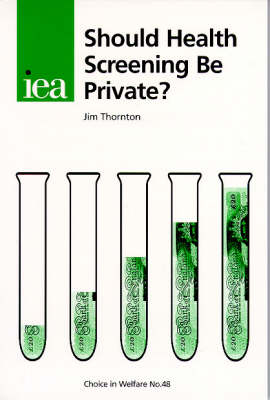
Should Health Screening be Private?
Seiten
2000
|
New edition
Civitas:Institute for the Study of Civil Society (Verlag)
978-1-903386-80-4 (ISBN)
Civitas:Institute for the Study of Civil Society (Verlag)
978-1-903386-80-4 (ISBN)
- Titel ist leider vergriffen;
keine Neuauflage - Artikel merken
Jim Thornton argues that some health screening programmes are of borderline benefit and it cannot be justified that the state should provide them. Excluding the screening of children, the handicapped, and pregnant women he says such programmes should be privatised and people should pay for them.
Some health screening programmes, such as that for rhesus immunisation in pregnancy, are dramatically effective. Others, including most adult programmes and those involving abortion, are of borderline overall benefit and may even do harm. Their value depends on the personal values of the participants. They are 'wants' not 'needs'. Since different people's values cannot be compared, it is impossible to make an overall cost/benefit analysis of such programmes, and the decision to offer some but not others by the state is arbitrary. Without state provision, much screening would still happen privately. State health provision may be justified if it provides an otherwise unobtainable public good, corrects market failure, if the state has a duty to rescue citizens in distress when no one else can, or if it protects the poor or weak. Few adult screening programmes, and no prenatal ones that involve abortion, can be justified on any of these grounds. Such programmes should be privatised and people should pay for them. The market will decide which are cost/beneficial.
Screening of children and the handicapped, and of pregnant women for the health of the baby, is justified by the state's duty to care for weaker citizens. Such programmes should continue. "Mr Thornton said the costs of running nationwide screening programmes were not justified." Daily Telegraph. "Mr Thornton believes it is only a matter of time before screening programmes are privatised and that help through charities and cheap deals offered by private health care companies would help the not so financially well off members of society to access screening provision." Pulse. "Pregnant women should not be screened by the Health Service for handicaps and deformities in their babies, according to a senior hospital consultant. He warned that...babies could one day be aborted if they are found to ...have genes linked with anti-social behaviour or homosexuality." Daily Mail. "Readers of this essay will be encouraged to think a bit more about why they hold the views that they do..." British Medical Journal.
Some health screening programmes, such as that for rhesus immunisation in pregnancy, are dramatically effective. Others, including most adult programmes and those involving abortion, are of borderline overall benefit and may even do harm. Their value depends on the personal values of the participants. They are 'wants' not 'needs'. Since different people's values cannot be compared, it is impossible to make an overall cost/benefit analysis of such programmes, and the decision to offer some but not others by the state is arbitrary. Without state provision, much screening would still happen privately. State health provision may be justified if it provides an otherwise unobtainable public good, corrects market failure, if the state has a duty to rescue citizens in distress when no one else can, or if it protects the poor or weak. Few adult screening programmes, and no prenatal ones that involve abortion, can be justified on any of these grounds. Such programmes should be privatised and people should pay for them. The market will decide which are cost/beneficial.
Screening of children and the handicapped, and of pregnant women for the health of the baby, is justified by the state's duty to care for weaker citizens. Such programmes should continue. "Mr Thornton said the costs of running nationwide screening programmes were not justified." Daily Telegraph. "Mr Thornton believes it is only a matter of time before screening programmes are privatised and that help through charities and cheap deals offered by private health care companies would help the not so financially well off members of society to access screening provision." Pulse. "Pregnant women should not be screened by the Health Service for handicaps and deformities in their babies, according to a senior hospital consultant. He warned that...babies could one day be aborted if they are found to ...have genes linked with anti-social behaviour or homosexuality." Daily Mail. "Readers of this essay will be encouraged to think a bit more about why they hold the views that they do..." British Medical Journal.
| Reihe/Serie | Choice in Welfare S. ; No. 48. |
|---|---|
| Verlagsort | London |
| Sprache | englisch |
| Maße | 148 x 210 mm |
| Themenwelt | Medizin / Pharmazie ► Gesundheitswesen |
| Studium ► Querschnittsbereiche ► Prävention / Gesundheitsförderung | |
| ISBN-10 | 1-903386-80-2 / 1903386802 |
| ISBN-13 | 978-1-903386-80-4 / 9781903386804 |
| Zustand | Neuware |
| Haben Sie eine Frage zum Produkt? |
Mehr entdecken
aus dem Bereich
aus dem Bereich
das Manual zur psychologischen Gesundheitsförderung
Buch | Hardcover (2023)
Springer Berlin (Verlag)
39,99 €
Wissenschaftlich basierte Empfehlungen, Tipps und Ernährungspläne für …
Buch (2022)
Thieme (Verlag)
51,00 €
Orthomolekulare Medizin in Prävention, Diagnostik und Therapie
Buch | Hardcover (2022)
Thieme (Verlag)
71,00 €


